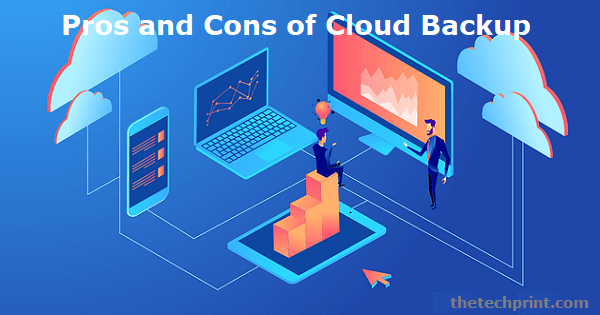Around 90% of businesses now run on the cloud, and by 2025, around 200 Zettabytes of data will be saved on the cloud. Cloud backup is backing up data to a remote location, typically in the cloud. This process helps to ensure that data is safe and can be accessed during a local disaster or other unforeseen events. Cloud backup can be used to supplement or replace traditional on-premises backup solutions. Cloud backup has many benefits, including convenience, scalability, and disaster recovery. In addition, cloud backup can often be less expensive than traditional on-premises backup solutions. But if you are considering switching from on-premises to the cloud, you need to consider some pros and cons of Cloud backup.
There are several pros of Cloud backup as compared to on-premises or in-house backup, including:
You can access your data anytime as long as you have an Internet connection. It doesn't matter what device you use - you can access it from your mobile, laptop or desktop. You can also grant different levels of access to your employees, increasing the security of valuable data and lowering the chances of inconvenience.
Cloud backup makes it easier for employees to collaborate on projects. They can share documents, files, and data in real time without worrying about losing the changes they've made.
When you store your data off-site, it's less likely to be compromised by physical threats like fires or floods. Cloud backup providers also have sophisticated security measures to protect data from cyberattacks. In addition, you can encrypt your data before it's sent to the cloud, which will further protect it from being accessed by unauthorized individuals.
Cloud backup is a scalable solution that can grow with your business. As your company expands, you can easily add more users and storage space without investing in new hardware or software.
Cloud backup can save you money on hardware, software, and energy costs. You won't need to invest in an on-premises backup solution or pay for maintenance and updates. In addition, you can often get discounts by paying for a long-term subscription which is one of the reasonable pros of cloud backup.
There are also some cons of Cloud backup that you need to be aware of before making the switch from on-premises backup, which include:
When you store your data off-site, you lose some control over it. You'll need to rely on the security measures of your cloud backup provider to keep your data safe. In addition, you may need help accessing certain features or customization options.
If the Internet connection is down, you won't be able to access your data. This can be a problem if you need to access it urgently. Cloud backup providers typically have measures in place to prevent extended downtime, but it's still something you need to be aware of.
The more reliant you are on the cloud, the more difficult it will be to switch back to an on-premises solution. This could be a problem if you experience issues with your cloud backup provider or if they go out of business.
While Cloud backup can save you money in the long run, the initial investment can be costly. You'll need to pay subscription fees, which can add up over time. In addition, you may need to purchase new hardware or software to be compatible with the cloud.
Storing your data off-site can increase the chances of it being compromised by hackers. In addition, you'll need to trust that your cloud backup provider will keep your data safe and secure. Do your research before selecting a provider to ensure they have a good reputation. Consider these cons of cloud backup especially when cybercriminals are also taking advanced approach to break-into business networks.
Conclusion on the pros and cons of cloud backup
The switch from on-premises to cloud backup can be a big decision for any business. But by understanding the pros and cons of cloud backup, you can make an informed decision about what's best for your company. Be your business small or big, cloud backup can be a great solution to help you save time and money and increase productivity.

While cloud backup has many advantages, there are also some disadvantages. These include potential downtime, limited control, increased dependence on the cloud, high initial costs, and security concerns.
There is no one-size-fits-all answer to this question. Your business's best cloud backup service will depend on your specific needs and requirements. Be sure to research and compare different providers before making a decision.
Cloud backup can be an excellent solution for businesses of all sizes. It can save you time and money and increase productivity. However, there are also some disadvantages to consider before making the switch. Be sure to weigh the pros and cons carefully to decide if cloud backup is right for your business.
The advantages of cloud backup include increased flexibility, scalability, and reduced costs. Cloud backup can also be an excellent solution for businesses with data spread across multiple locations.